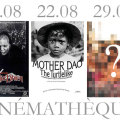After our retrospective on Samira Makhmalbaf, we’ll now proceed to films about Indonesia from various backgrounds. First will be Tjoet Nja’Dhien by Eros Djarot (1986), an established classic and the first Indonesian film ever to be screened in Cannes Film Festival. Next will be Mother Dao, the Turtlelike by Vincent Monnikendam (1995), yet another interesting “reconstruction” of documentary, this time from old archival colonial footages. Last will be a surprise movie. (Drop by to our screenings and maybe you’ll pick up some clues.) All films are screened on Saturday at 5pm, please be on time.
15 August 2009
Tjoet Nja’Dhien | Eros Djarot
1986 – Color – 133 minutes
Producer: PT Kanta Indah Film, PT Ekapraya Film (Handi Muljono, Eros Djarot). Director: Eros Djarot. Skenario: Eros Djarot. Story: Eros Djarot. Photography: George Kamarullah. Artistic: Benny Benhardi. Editor: Karsono Hadi. Sound: Hartanto. Actors: Christine Hakim, Pitrajaya Burnama, Hendra Yanuarti, Slamet Rahardjo, Rita Zahara, Hermin Centhini, Roy H. Karyadi, Fritz G. Schadt, John Iskandar, Tuanku Djalil, Joes Terpase, Eko Handoko.
Set in 1896, Tjoet Nja Dhien celebrates one of Indonesia’s great heroes who fought for independence from the Dutch. The pious Muslim people of Aceh, a city that had flourished since ancient times as a trade port, enter into a fierce war with the Dutch. Tjoet Nja ‘Dhien, the widow of a rebel leader operating in Aceh in Sumatra, assumes the leadership when her husband Teuku Umar is killed in an ambush. ‘Dhien’s charismatic presence and power of survival motivate the locals to join and later continue their opposition to the Dutch. Despite personal obstacles, she remained in the thick of the struggle for ten years. First Indonesian film ever to be screened in Cannes Film Festival.
22 August 2009
Mother Dao, the Turtle Like | Vincent Monnikendam
1995 – Colour – 90 mins – Indonesia / Indonesian with Dutch subtitle
Original title: Moeder Dao, de schildpadgelijkende
This interesting Dutch documentary offers a look, via archival film clips, at Dutch colonialism in Indonesia during the early 20th century. These old films were made to educate people in Holland about activities in the West Indies and include shots of native religious ceremonies and daily habits, as well as propagandistic shots of the natives being “civilized” by the colonists who avoided native ways as much as possible during their stay there. The film is not narrated so as to let viewers draw their own conclusions. The soundtrack is comprised of Indonesian music and songs as well as several spoken poems. — Sandra Brennan
Lukas’ Moment | Aryo Danusiri, 2005
29 August 2009
Opera Jawa | Garin Nugroho
2006 – Colour – 120 min.
Opera Jawa (Requiem from Java) is a 2006 Indonesian-Austrian musical film directed by Garin Nugroho that features traditional Javanese classical music and dance in a setting of opera that is inspired by the “The Abduction of Sita” episode from the Ramayana. The film was commissioned for Peter Sellars’ New Crowned Hope festival in celebration of the 250th anniversary of the birth of Wolfgang Amadeus Mozart. In addition to music by Rahayu Supanggah, the film features installation art production design by Nanang Rhamat.
2 September 2009
Jermal | Ravi Bharwani
2008 – Colour – 90 min.
Setelah kematian ibunya, Jaya (12) dikirim ke ayahnya, Johar, yang bekerja sebagai pengawas di sebuah jermal (tempat penjaringan ikan yang dibangun di atas tonggak-tonggak kayu di tengah lautan). Johar terkejut karena ia tak pernah tahu bahwa ia punya seorang anak. Ia tak mau mengakui Jaya sebagai anaknya. Namun ia tak mungkin membawa Jaya kembali ke daratan karena masa lalunya yang kelam; oleh karena itu Johar terpaksa menerima Jaya sebagai pekerja jermal.
Walaupun dihadapkan dengan penolakan ayahnya dan gangguan serta ejekan anak-anak pekerja jermal, Jaya tak mau menyerah pada nasib. Ia melepaskan harapan akan pengakuan ayahnya dan memutuskan untuk mempelajari keterampilan serta sikap yang diperlukan untuk bertahan hidup di atas jermal. Seiring berjalannya waktu, Jaya berubah menjadi seperti anak-anak jermal yang lain: survivor yang tangguh dan keras. Sementara Johar terpaksa menghadapi dan menerima masa lalunya. Akhirnya, baik Johar maupun Jaya menyadari bahwa mereka terikat oleh masa lalu, dipertemukan di ruang
sempit di mana mereka berada, serta terhubung oleh kebenaran yang tak mungkin dihindari.


Leave a Reply